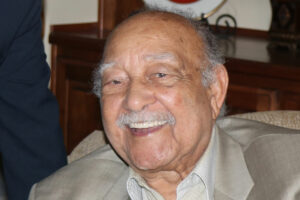Topic: Brown v. Board

Interview of Jack Alexander, October 26, 2020
Interviewed by Michael (Mike) Lennen
In this 2020 oral history interview, Jack Alexander reflects on his early life growing up in Topeka, Kansas in the 1930s and 1940s, and his extensive public service career beginning with enlistment in the Navy. Alexander served in various roles both in local government, particularly as Water Commissioner for the City of Topeka, and in state government, including appointment to the Kansas Corporation Commission. He also made significant contributions to local volunteer organizations. Alexander’s recollections create a portrait of an individual committed to public service based on a solid foundation in family and community and a sincere appreciation of and Show Moreconcern for others.
Highlights -- short excerpt from the interview
